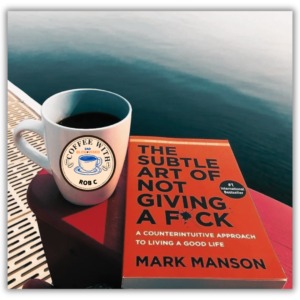Let’s face it, we’re all drowning in a sea of self-help books promising to transform us into unstoppable, perpetually grinning superhumans. But what if I told you there’s a book that says, “Screw that noise!” and actually makes sense? Enter “The Subtle Art of Not Giving a F*ck” by Mark Manson, a refreshing tsunami in an ocean of saccharine positivity.
Now, before you clutch your pearls at the profanity, let me assure you – this isn’t just shock value. Manson’s liberal use of the F-bomb serves a purpose: to jolt us out of our comfort zones and make us pay attention. And boy, does it work.
As I dove into this book, I found myself nodding along, laughing out loud, and occasionally muttering, “Well, shit. He’s got a point.” Manson’s writing style is like that brutally honest friend who tells you that yes, those jeans do make your butt look big, but hey, at least you have a butt. It’s refreshing, it’s real, and it’s exactly what we need in this era of Instagram filters and carefully curated social media personas.
The central premise of the book is simple yet revolutionary: stop trying to be positive all the time. It’s okay to feel bad. It’s okay to fail. It’s okay to be average. In fact, accepting these truths is the key to living a more fulfilling life. Mind. Blown.
Manson argues that our society’s obsession with positivity and exceptionalism is actually making us miserable. We’re constantly chasing happiness, success, and perfection, and when we inevitably fall short, we feel like failures. It’s a vicious cycle that leaves us feeling anxious, depressed, and perpetually unsatisfied.
But fear not, dear reader! Manson isn’t here to leave us wallowing in a pit of existential despair. Instead, he offers a counterintuitive approach to living a good life: embrace the suck. Accept that life is full of problems, and instead of trying to avoid them, focus on solving the ones that matter.

One of my favorite concepts from the book is the idea of “the feedback loop from hell.” It goes something like this: You feel anxious about something, then you feel anxious about feeling anxious, then you feel anxious about feeling anxious about feeling anxious… and so on until you’re basically a human pretzel of anxiety. Sound familiar? Manson’s solution? Accept the initial anxiety and move on. Don’t give a f*ck about feeling anxious. It’s simple, yet mind-blowingly effective.
Another gem is Manson’s take on values. He argues that we’re responsible for everything in our lives, whether we like it or not. This doesn’t mean we’re to blame for everything that happens to us, but we are responsible for how we interpret and respond to those events. It’s a subtle distinction, but an important one. By taking responsibility for our experiences, we regain control over our lives.
Manson also tackles the thorny issue of self-esteem. Instead of trying to feel good about ourselves all the time, he suggests we should get comfortable with our flaws and uncertainties. After all, if we’re awesome all the time, how can we ever improve? It’s a humbling perspective, but one that ultimately leads to genuine growth and self-acceptance.
Throughout the book, Manson peppers his wisdom with personal anecdotes and hilarious observations. From his adventures as a broke backpacker to his experiences in the blogging world, his stories are relatable, entertaining, and drive home his points in a way that dry self-help tomes never could.

One of my favorite passages is when Manson discusses the “do something” principle. Instead of waiting for inspiration or motivation to strike, he advocates for taking action, no matter how small. This resonated with me deeply, as I’ve often found myself paralyzed by indecision or lack of motivation. Manson’s advice? Just do something. Anything. The motivation will follow.
As I neared the end of the book, I found myself both energized and oddly calm. Manson’s philosophy isn’t about not caring about anything – it’s about choosing what to care about carefully. It’s about investing our f*cks wisely, if you will.
The book concludes with a poignant reflection on death. Manson argues that embracing our mortality is the key to living a meaningful life. It’s a sobering thought, but one that puts everything into perspective. If we’re all going to die anyway, why not focus on what truly matters to us?
Now, I know what you’re thinking. “This all sounds great, but how do I actually apply this in my life?” Well, my friend, that’s the beauty of Manson’s approach. He doesn’t offer a one-size-fits-all solution or a step-by-step guide to happiness. Instead, he provides a framework for thinking about life’s challenges in a new way.
Since reading “The Subtle Art of Not Giving a F*ck,” I’ve found myself more relaxed, more focused, and oddly enough, more motivated. I’ve stopped beating myself up over small failures and started celebrating small victories. I’ve become more selective about what I care about, and as a result, I care more deeply about the things that truly matter.
Is this book a magic bullet that will solve all your problems? Hell no. But it might just give you the perspective shift you need to start solving them yourself.
In conclusion, if you’re tired of fluffy self-help books that promise the moon and deliver a handful of stardust, give “The Subtle Art of Not Giving a F*ck” a try. It’s raw, it’s real, and it might just change your life. Or not. And you know what? That’s okay too.
Remember, as Manson would say, “The desire for more positive experience is itself a negative experience. And, paradoxically, the acceptance of one’s negative experience is itself a positive experience.” So go ahead, embrace the suck, give fewer f*cks, and see where it takes you. Who knows? You might just end up exactly where you need to be.
This Book is awesome, if you want to pick up a copy for yourself, check out this link: The Subtle Art of Not Giving a F*ck: A Counterintuitive Approach to Living a Good Life

